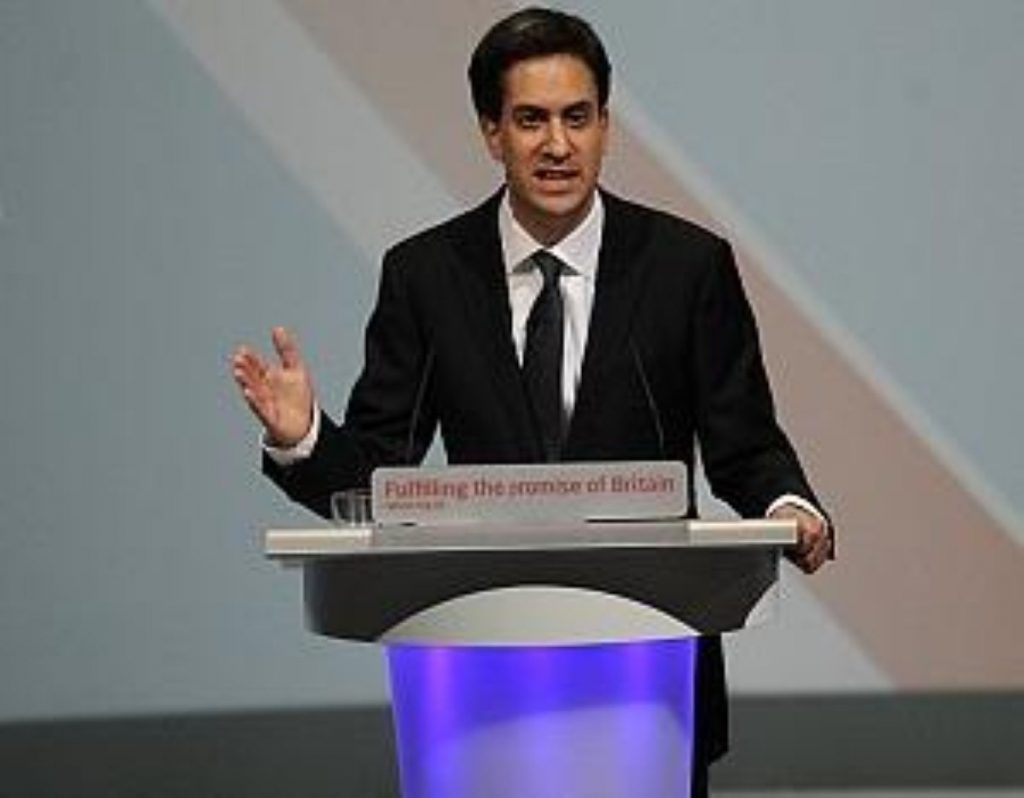Analysis: Ed Miliband’s new bargain
The 'new bargain' has given Ed Miliband a heading for his blank sheet of paper. But the details still need to be filled in.
By Alex Stevenson Follow @alex__stevenson
"It's all about tone," one of Ed Miliband's chief spinners told me after one of the Labour leader's more successful prime minister's questions. "The actual words don't matter."
That approach explains a lot about Miliband's style. He has refused to be rushed into a grand narrative, let alone policies, during his first 12 months in the job. Partly this is because he is the first leader of the opposition to know that he will be spending a full five years in the job. The resulting mental attitude has been: what's the rush?


Unfortunately for Miliband, there are problems with this approach. It makes him seem sluggish, dull and unconvincing as a politician. Only during the riots did he seem animated, spurred on by the urgency of the crisis. Today's poll by ComRes suggests the riots were not enough to rescue his first year in the job. Just one in four people view him as a credible prime minister.
This speech, when the entire political world pays attention more than at any other time, was a big opportunity to change the trend. And there can be no doubt Miliband delivered the goods his strategists hope will change the trend. His moral compass has finally begun pointing in a clear direction – towards the "new bargain" which affects everyone in Britain.
In Miliband's view, British society is divided into the "right" people and the wrong 'uns, those villains of 21st century culture: the greedy businessmen, the unscrupulous journalists, the feral rioters. It doesn't matter what social class you belong to. If you wear a suit and work in the City, do you create wealth or strip assets? If you're a low-paid worker, do you go out smashing things up at the first opportunity, or contribute to the community?
Miliband took the ingredients of the last year and put them through the Labour wringer. He revived those emotions of disgust and horror at the hacking of Milly Dowler's phone, at Fred Goodwin's knighthood, at the way a private equity firm dealt with the Southern Cross care homes. The reaction is shaking heads. "It must change," he urged, as the applause grew beneath him. "It must never happen again in the new economy we build!"
Those emotions were swiftly turned his own goal: attacking 21st century Britain as a "country for the insiders". It's his version of David Cameron's "broken Britain" rhetoric, a form of disappointment borne of exclusion by those at the top as well as those at the bottom. It's the difference between those on the outside, frustrated that they haven't been let in, and the Tories being trapped on the inside, determined to keep everyone else out.
The result is a one-moral-size-fits-all approach which will resonate well with his target audience, the "squeezed middle". He will be able to refer back to the theme of this speech in every media appearance for months.
But is that enough? Miliband's staff have tried to make a virtue out of the fact this speech contains no detailed policy announcements. There is a risk he will fail the "so what?" test as the British public absorbs the message of this speech. They'll want to know 'what are you going to actually do about it?'
This is why we shouldn't expect there to be a sudden shift in the first opinion polls after today. Miliband will continue to be regarded with a certain disdain, for he has not yet got round to coming up with the alternatives which would make Labour a more powerful force.
Still, he will have done enough to convince his party to stick with him. And his strategists will know that there are still, even now, nearly four years to go until the next general election. That's a very long time. And so Miliband continues to play the long, long game. He'll have to keep his fingers crossed that his party continues to play along with him.












